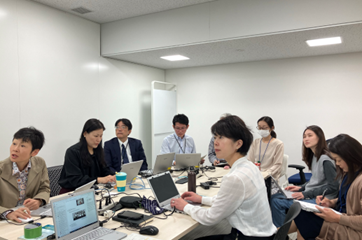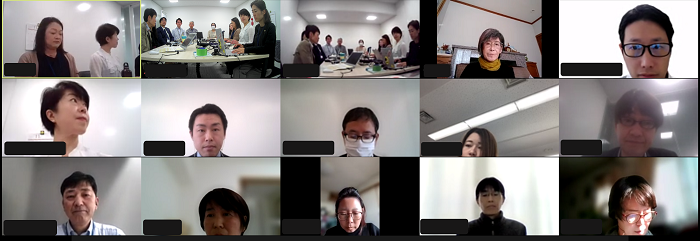April, 2025
In November 2024, Eisai’s Sustainability Department conducted online socialization program with systemic sclerosis (SSc) patients. This opportunity was made possible with the support of the Japan Scleroderma Patients’ Association – Kizuna, who enabled the socialization program with two patients, and whose board later joined the Eisai staff in a roundtable meeting.
The Sustainability Department is working on the development of new drugs and the provision of treatments for neglected tropical diseases (NTDs) such as lymphatic filariasis and mycetoma. However, opportunities to directly interact with patients with these diseases are very rare in Japan.
Rare and intractable diseases have many similarities with NTDs, such as low awareness even among healthcare professionals leading to delays in diagnosis and treatment, and a high likelihood to be overlooked as targets for new drug development. SSc, one such rare and intractable disease, involves challenges such as skin problems (skin hardening), various limitations on daily activities, prolonged diagnosis processes, difficulty in gaining understanding from those around them, and the psychological burden resulting from these issues. These issues are similar to those experienced by patients of mycetoma, for which Eisai has been working on development of a treatment, as well as lymphatic filariasis, for which Eisai provides treatment free of charge through the World Health Organization (WHO).
Therefore, the Sustainability Department members held this socialization program, aiming to utilize the insights and thoughts gained through socialization with SSc patients in their work and initiatives towards NTDs. The patients and the board members of the Patients’ Association, some of whom are also directly affected by SSc, agreed to participate in the socialization program, hoping that their own experiences could contribute to patients in distant places, such as Africa and Asia.
Two patients participated in the program and shared their symptoms, daily life, worries and joys.
The Challenge of Time Needed for Diagnosis and Facing the Disease
The rate of disease progression and symptoms, the process until diagnosis, as well as treatment effectiveness, varies greatly among patients. Acceptance of the disease and emotional changes also differ for each individual.
It may take a long time to get diagnosis and treatment for various reasons, such as patients disregarding the disease even when feeling something was wrong or wanting to ignore the symptoms after they appeared, as well as medical professionals lacking knowledge about the disease and being unable to diagnose properly due to limited information.
One of the patients told us that initially, they couldn't even talk about their illness with their children or colleagues. However, after meeting other patients, their feelings about wanting to hide the illness changed. As their symptoms progressed, they reconsidered and decided to get treatment, and recently shared their illness to those around them.
Interaction and Support from Others Are Essential for Treatment
Understanding and warm support from family, workplaces, and healthcare professionals are undeniably essential for patients. The patients who joined the socialization program also emphasized the significance of networking with peers. While certain topics may be difficult to discuss with close family and friends, patients can openly share their thoughts with fellow patients and decrease their emotional burden, exchange concerns, and gain practical advice for daily life. Additionally, even when patients receive various coping strategies from healthcare professionals, following the instructions individually can be challenging. Some patients expressed that they would appreciate the support from government agencies and pharmaceutical companies in building networks that help them stay connected with society, such as creating spaces where they can meet in person to share their concerns and seek support.
What left a particularly strong impression was their optimistic attitude. They expressed their desire to build a network by themselves in the future in appreciation for the support they have received.
Supporting the Patient Journey
What we reaffirmed through conversations with patients is that disease awareness plays a major role in ensuring timely access to medical care. On the other hand, the reality is that the availability of disease-related information and awareness activities varies depending on patients’ place of residence and the local healthcare environment. There is growing need to establish an environment that ensures appropriate support at each stage of the patient journey, from the moment they sense that “something is wrong” to each stage of diagnosis, treatment, and care.


In December 2024, we held a discussion with the board members of the Patients’ Association, reiterating the importance of raising awareness about SSc and fostering understanding in society. Additionally, we recognized the significance of patient interaction, and the necessity and importance of expanding such opportunities while building a solid foundation for obtaining comprehensive information.
Although countries and diseases may differ, common thoughts are shared among patients. Eisai will continue in its commitment to NTDs, striving to create a more comfortable environment for patients through partnerships while applying the knowledge and insights gained through this opportunity.
